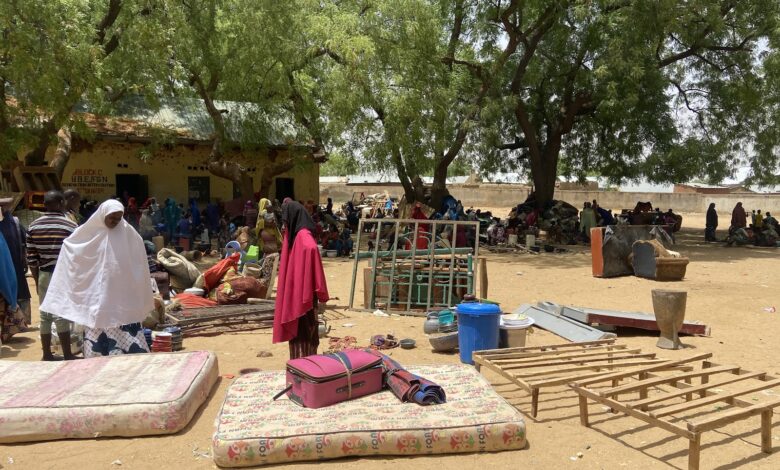They Were Sacked For Informing On Terrorists. Now They Can’t Return Home
Hundreds of displaced residents in the Isa area of Sokoto are stuck in displacement camps after terrorists set their villages on fire. Many of them say security operatives have left them to their fate.

More than two months after motorcycle-riding terrorists burnt down villages in the Isa area of Sokoto, North West Nigeria, several residents are still waiting to return home.
In April, the terrorists raided many rural communities in the area, including Gidan Sale, Girnashe, Kuka Tara, Tozai, and Tubali, in retaliation for being reported to security forces.
A recent report by HumAngle documented the devastation caused by the assault. The report revealed how the terrorists razed more than half of the settlements in the region, leaving hundreds of locals displaced and their food storage destroyed. Many of those displaced, including women and children, are now forced to seek shelter in public facilities like the Mai Tandu Model Primary School in the main town.
The armed violence has left indelible marks on the axis, as many locals say they cannot return home.
“There is no single person in Gidan Sale,” Haliru Ahmad, a village head in the area, told HumAngle. “Everyone of us is in the town because those people (referring to the terrorists) are there. How can we return when there is no guarantee that we won’t be attacked?”
The terrorists are still lurking around their villages because there are no security operatives to protect them. Many of their houses have either been completely or partially destroyed.
Terrorist attacks have changed the structure of rural communities in many northwestern states. A recent HumAngle satellite imagery analysis shows how violent raids by terrorists and local security groups have emptied many settlements in the region.
During our recent trip to the axis following the fatal attack, HumAngle observed that the 90-kilometre stretch of Marnona-Isa Road, along which these villages are located, has no security checkpoints. Road users have now abandoned the routes for a much farther and equally unsafe Sabon Birnin road.
“If they can give us any police or army officers that can go there to protect us, we would return because if they are there, the terrorists won’t come. I’ve been saying it before now, even before our villages were attacked. We need security,” Haliru added.
Terrorists have subjected locals in the northwestern region to a reign of terror for nearly a decade now, yet authorities struggle to contain the growing armed violence. They have continued to sack villages, sexually assault women, impose levies on communities, kill locals, and control a million-dollar kidnap-for-ransom enterprise to keep their operations running.
Authorities have carried out air raids, launched offensives into their hideouts in the forests, shut down telecommunication services in the past and even designated them as terrorists, allowing for stiffer sanctions under the Terrorism Prevention and Prohibition Act 2022. Still, thousands of the terrorists occupy large swathes of the region’s ungoverned spaces, which they use as springboards to launch their attacks, stockpile weapons, and hold their abductees.
Support Our Journalism
There are millions of ordinary people affected by conflict in Africa whose stories are missing in the mainstream media. HumAngle is determined to tell those challenging and under-reported stories, hoping that the people impacted by these conflicts will find the safety and security they deserve.
To ensure that we continue to provide public service coverage, we have a small favour to ask you. We want you to be part of our journalistic endeavour by contributing a token to us.
Your donation will further promote a robust, free, and independent media.
Donate HereStay Closer To The Stories That Matter




